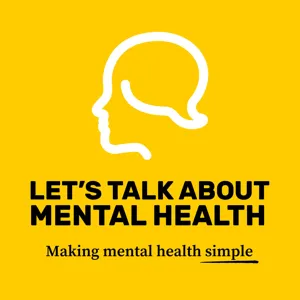Podcast Summary
The Burden of Keeping Secrets: Secrets can negatively impact our well-being and relationships. Different types of secrets and appropriate disclosure times were discussed, along with insights into personality, morality, trauma, developmental psychology, and communication.
Keeping secrets can be burdensome and impact our relationships and well-being more than just maintaining privacy. In the podcast, Michael Slepian, an expert on the psychology of secrets, discussed how carrying a secret alone can weigh us down. He explored different categories of secrets and when it's appropriate to reveal them. The podcast also touched on topics like personality, morality, trauma, developmental psychology, and communication. A surprising revelation from Michael's own life, where he discovered his father was not biologically his parent, inspired him to delve deeper into the topic of secrets. Overall, the episode provided insights into the hidden world of secrets and their impact on our lives.
The Complexity of Secrets: Secrets involve intentionally withholding information and result from perspective-taking skills, language development, and recognition that not all info is shared among individuals.
Secrets are more than just hidden information; they involve the intention to withhold that information from others. The act of keeping secrets is not as rare or complex as it may seem, as humans have the ability to understand other minds and keep information to themselves due to the development of perspective-taking skills. However, the burden of secrets doesn't only come from concealing them but also from the moments when they hurt us the most. Secrets have been a part of human behavior for a long time, with evidence suggesting that even chimpanzees can conceal objects and actions from others. Language plays a role in the evolution of secrets, but the ability to keep secrets is ultimately a result of our ability to recognize that not all information is shared among individuals.
Understanding the difference between secrecy and privacy: People keep around 13 types of secrets, including personal thoughts, lies, and family secrets. Personality traits like conscientiousness influence how many secrets people keep, while openness and agreeableness do not.
Secrecy and privacy are not the same. While privacy refers to the comfort level of an individual in revealing sensitive information, secrecy involves the deliberate withholding of information from others. The average person keeps around 13 different kinds of secrets at any given moment, with common categories including extra-relational thoughts, lies, secret ambitions, and family secrets. Personality traits, particularly conscientiousness, have been found to be reliably related to the number of secrets people keep. However, openness and agreeableness do not have a significant association with secret keeping, as people with these traits are more likely to experience secret-worthy situations but not necessarily more likely to keep them hidden.
The role of secrets in relationships: Secrets can strengthen or harm relationships, with gossiping sometimes playing a role. Confiding in secrets builds trust, but revealing them to the wrong person can cause harm.
Secrets play a significant role in relationships, both positively and negatively. Extroverted couples find themselves in more situations that involve secrets but keep fewer of them hidden. Gossiping, which is often driven by the desire for interesting information or to harm the reputation of a bad actor, can also be related to the sharing and keeping of secrets. While confiding in secrets can strengthen relationships and build trust, revealing secrets to the wrong person can lead to harm and damage the relationship. This dynamic is not only relevant to positive psychology and high-quality relationships but also in the business world. Secrets can expand or contract our perception box, and holding a secret can cause shame and contraction. Children as young as age three begin trying to keep secrets, and the amount of secret-keeping may peak during adolescence. Understanding the role of secrets in our lives and relationships can help us navigate the complexities of human connection.
Teaching Children the Difference Between Healthy Privacy and Harmful Secrecy: Encourage teenagers to speak up about their secrets, recognizing the difference between healthy privacy and harmful secrecy, and understanding common categories of secrets like sexual behavior, emotional infidelity, and trust violations.
While children naturally develop the ability to keep secrets as they grow older, secrecy can become harmful during adolescence when teenagers hide their worries, struggles, and shames. It's essential to teach them the difference between healthy privacy and harmful secrecy and encourage them to speak up when they're being harmed or harming others. Some common categories of secrets include extra relational thoughts, sexual behavior, emotional infidelity, personal stories, counter normative behaviors, theft, ambition, self-harm, work or school cheating, romantic desire, lies, trust violations, family secrets, and no sex (including feeling like one is not having enough sex). Understanding these categories can help us recognize the importance of open communication and the potential harm of keeping secrets.
The Importance of Secrets and Trust in Childhood: 97% of people have secrets, healthy childhood relationships foster trust and privacy, parents should respond compassionately to children's secrets, and effective coping skills are essential.
People keep secrets for various reasons, and these secrets can range from harmless quirks to more serious matters like infidelity or financial issues. The study found that 97% of participants had at least one secret. The development of healthy relationships in childhood, where privacy and trust are fostered, can help prevent excessive secret-keeping. Parents should respond with compassion and acceptance when their children reveal secrets, and model effective coping skills themselves. This advice not only applies to the topic of secrets but is valuable parenting advice in general. While the study of secrets is not a prevalent topic in psychological literature, it is an important one as secrets can significantly impact individuals and relationships. Other researchers in the field are also studying this topic to gain a better understanding of its implications.
Discussing secrets through writing or talking to someone can improve well-being: Expressive writing or sharing secrets with a trusted person can challenge negative thoughts and improve well-being. Morality plays a role in secret keeping, and it's essential to find a confidant with similar moral values.
Engaging in expressive writing, such as journaling, can help individuals challenge their own counterproductive thoughts and find new perspectives when they're trying to go it alone. However, the more journaling resembles talking to someone, the more effective it can be. The most commonly confided secrets include work discontent and dissatisfaction, as people often discuss these issues with others. Morality plays a significant role in secret keeping, as individuals who believe their secrets to be immoral often experience more shame and rumination, leading to negative impacts on their well-being. When deciding whom to confide in, it's essential to find someone who shares a similar moral perspective on the issue to ensure a supportive and helpful response. Additionally, some secrets, like white lies told to be nice, are generally considered acceptable to keep.
The Complexity of Keeping Secrets: Honesty and openness are important, but keeping secrets can be necessary to protect relationships or prevent harm. Decisions to reveal secrets should consider reasons, consequences, and the other person's wishes.
While it's generally considered nicer to keep secrets to avoid hurting someone's feelings, there are exceptions. When keeping a secret could damage a relationship or cause harm, honesty and openness are expected. The decision to reveal a secret is a complex one, and it's important to consider the reason for keeping it, the potential consequences, and whether the other person would want to know. Utilitarians might have a field day thinking about the potential harm versus good. A notable example is the case of two Illinois public defenders who kept a secret for 26 years about a client's murder, which led to an innocent person's wrongful imprisonment. The secret was difficult to carry because it was a constant reminder of the injustice they were unable to rectify. Ultimately, the decision to reveal a secret is a significant one that can have lasting consequences, and it's essential to consider all the factors before making a decision.
Expressing Secrets for Personal Growth: Expressing traumatic experiences through writing or talking to someone can lead to better health outcomes. Seeking emotional support and perspective from others can help unlock unique potential.
Having a filter when it comes to sharing secrets or dealing with trauma can be beneficial for our well-being. James Pennebaker's research shows that expressing traumatic experiences through writing or talking to someone can lead to better health outcomes. While journaling can be helpful for some, talking to a person offers emotional support and the ability to provide perspective. The average experience of confiding a secret is reported as helpful, even if the response is lukewarm. The 3-day Self Actualization Coaching Intensive, which incorporates evidence-based tools and insights from research, can help coaches more effectively help their clients unlock their unique potential. The 3 dimensions of secrets are not defined by specific categories, but rather by the impact they have on individuals and their relationships. Understanding the importance of expressing secrets and the benefits of seeking support can lead to positive personal growth.
Three Dimensions of Secrets: Secrets can be categorized into morality, relational involvement, and goal orientation dimensions. Understanding these dimensions can help identify the impact of a secret and provide a path forward. When confronted, deflecting questions can change the conversation's direction.
Secrets can be meaningfully categorized into three dimensions based on research using factor analysis from participant data. The first dimension is morality, where the immorality of a secret determines the level of shame felt. The second dimension is relational involvement, where secrets can be highly relational or more personal and individual. The third dimension is goal orientation, where secrets can be driven by clear goals or more emotional experiences. Understanding these dimensions can help identify how a secret might be hurting us and provide a helpful path forward. Additionally, when confronted with direct questions about a secret, deflecting the conversation by asking a question or introducing a new topic can effectively change the direction of the conversation.
Expressing gratitude and acknowledging value in private matters: When sharing sensitive matters, express appreciation for concern and acknowledge relationship value, but indicate it's not the right time to discuss. For creative projects, consider anonymous methods or talk it out for best results.
When faced with the dilemma of sharing a private or sensitive matter with someone, it's important to express appreciation for their concern and acknowledge the value of the relationship, while also indicating that it's not the right time to discuss it. Regarding creative projects and secret revealing, anonymous methods like Post Secret can help alleviate the burden of secrecy, but ultimately, talking to someone about it is the most beneficial. Positive secrets, such as surprise parties or promotions, can be exciting and empowering due to the control and positive outcome they offer. However, some people may choose to keep positive secrets, like hobbies or personal joys, to themselves to avoid potential misunderstanding or disapproval.
Exploring the impact of secrets on our well-being: Reflecting on reasons for keeping secrets and finding ways to feel good about them can lead to reduced stress and increased autonomy and independence.
Secrets, whether positive or negative, can bring about different feelings of solitude and autonomy. Positive secrets can make us feel in control and independent, while negative secrets can lead to social isolation and feelings of shame. The question then becomes, how can we cultivate a sense of positivity and self-assurance around our other secrets? The speakers suggest reflecting on the reasons behind keeping these secrets and finding ways to feel good about them. It's important to remember that secrets, like money management, can have a significant impact on our overall well-being and happiness. By seeking clarity and control, we can reduce stress and live more fulfilling lives. Whether it's through financial planning or personal growth, taking steps to understand and manage our secrets can lead to a greater sense of autonomy and independence. So, next time you find yourself keeping a secret, consider the reasons behind it and explore ways to turn it into a positive force in your life.






